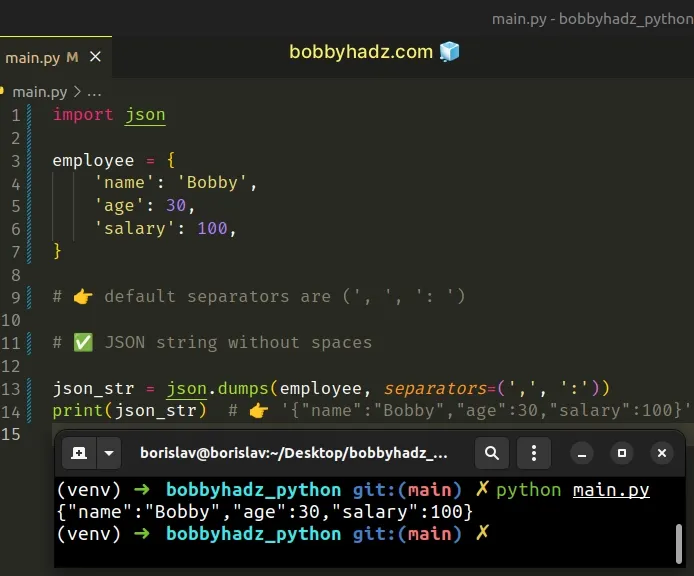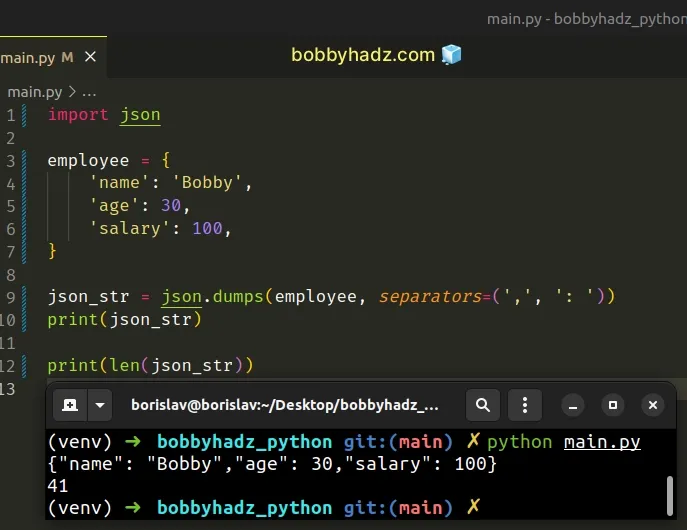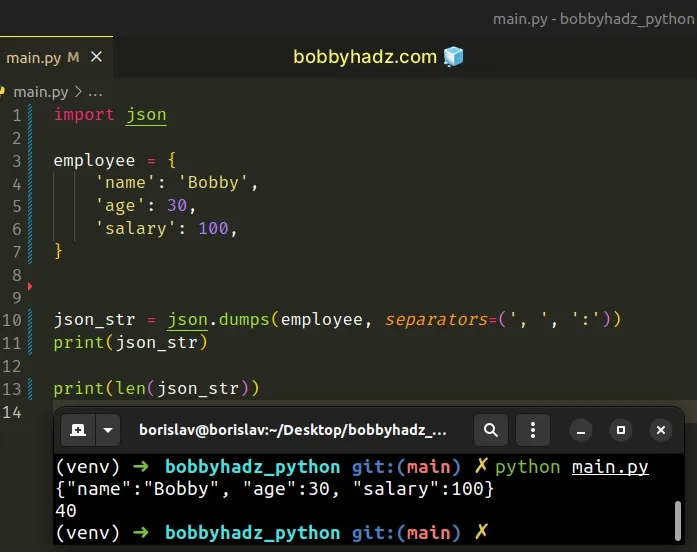Using json.dumps() without Spaces in Python
Last updated: Apr 9, 2024
Reading time·2 min

# Using json.dumps() without Spaces in Python
Use the separators keyword argument to use the json.dumps() method without
spaces.
The separators argument can be set to a tuple containing a comma and a colon
to remove the whitespace.
import json employee = { 'name': 'Bobby', 'age': 30, 'salary': 100, } # 👉️ default separators are (', ', ': ') # ✅ JSON string without spaces json_str = json.dumps(employee, separators=(',', ':')) print(json_str) # 👉️ '{"name":"Bobby","age":30,"salary":100}' # ----------------------------------------------- # ✅ JSON string with spaces only between keys and values json_str = json.dumps(employee, separators=(',', ': ')) print(json_str) # ✅ '{"name": "Bobby","age": 30,"salary": 100}' # ----------------------------------------------- # ✅ JSON string with spaces only between key-value pairs json_str = json.dumps(employee, separators=(', ', ':')) print(json_str) # ✅ '{"name":"Bobby", "age":30, "salary":100}'

We used the separator keyword argument to add no extra whitespace to the
output of the json.dumps() method.
The json.dumps() method converts a Python object to a JSON formatted string.
separators argument is a tuple containing 2 values - the separator between each key-value pair and the separator between each key and value.The default value for the argument is (', ', ': ') if the indent argument is
None and (',', ': ') if indent is set to any other value.
import json employee = { 'name': 'Bobby', 'age': 30, 'salary': 100, } # 👇️ default behavior print(json.dumps(employee)) # 👇️ {"name": "Bobby", "age": 30, "salary": 100} print(len(json.dumps(employee))) # 👉️ 43 # 👇️ with whitespace removed json_str = json.dumps(employee, separators=(',', ':')) print(json_str) # 👉️ '{"name":"Bobby","age":30,"salary":100}' print(len(json_str)) # 👉️ 38
If you still get whitespace when converting to JSON, make sure you aren't
passing a value for the indent argument.
import json employee = { 'name': 'Bobby', 'age': 30, 'salary': 100, } # { # "name":"Bobby", # "age":30, # "salary":100 # } json_str = json.dumps(employee, indent=4, separators=(',', ':')) print(len(json_str)) # 👉️ 54
The indent keyword argument pretty prints the JSON string with the specified
indent level. The argument is set to None by default.
indent argument to None or omit it when calling json.dumps().# Adding spaces only between the keys and the values
If you need to add whitespace only between the keys and the values, set the separator to a colon and a space.
import json employee = { 'name': 'Bobby', 'age': 30, 'salary': 100, } json_str = json.dumps(employee, separators=(',', ': ')) print(json_str) # 👉️ '{"name": "Bobby","age": 30,"salary": 100}' print(len(json_str)) # 👉️ 41

# Adding spaces only between the key-value pairs
Similarly, if you need to add a space only between the key-value pairs, set the separator to a comma and a space.
import json employee = { 'name': 'Bobby', 'age': 30, 'salary': 100, } json_str = json.dumps(employee, separators=(', ', ':')) print(json_str) # 👉️ '{"name":"Bobby", "age":30, "salary":100}' print(len(json_str)) # 👉️ 40

# Additional Resources
You can learn more about the related topics by checking out the following tutorials:
- JSONDecodeError: Expecting value: line 1 column 1 (char 0)
- json.decoder.JSONDecodeError: Invalid control character at
- json.decoder.JSONDecodeError: Expecting ',' delimiter: line 1
- JSONDecodeError: Expecting property name enclosed in double quotes: line 1 column 2 (char 1)
- json.decoder.JSONDecodeError: Extra data in Python [Solved]
- How to merge multiple JSON files in Python [3 Ways]

